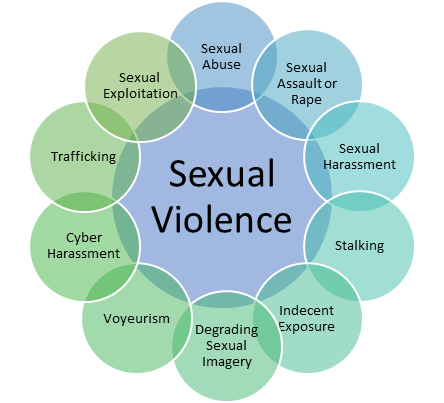What is sexual violence?
Sexual violence is a broad term that describes behaviours and actions that are sexual in nature and are unwanted, coerced, and committed without consent. This includes words — both written and spoken.
Sexual violence is about exerting power and control over others.
It can include a variety of acts and experiences and may also be known as sexual assault, rape, sexual abuse, exploitation, incest, date rape, and human trafficking. Sexual violence also includes, but is not limited to: sexual harassment and catcalling, indecent exposure, stalking, showing or distributing demeaning sexual imagery, and online harassment, also known as cyber-violence.

People of all genders can be subject to sexual violence. However, sexual violence is mostly experienced by women, children — including boys — and transgender and gender non-conforming people. It can be a single occurrence, or can be ongoing by the same or different perpetrator. Sexual violence can happen to people of any age, gender, race, sexual orientation, and economic background. However, some marginalized groups, such as a racialized and Indigenous women, people with disabilities, low-income women, people with addictions, young women, and transgender folks experience higher rates of sexual violence.
Sexual violence is a serious heath, social, and public safety issue in Nova Scotia that affects all of us. Everyone deserves to live safely. We all have a role in ending sexual violence.
What is rape culture?
Rape culture is a term that describes an environment where rape is pervasive, normalized, and accepted as inevitable. Rape culture is largely perpetuated via unexamined and false beliefs about sexual violence, however, sexual violence may also be promoted in an outward, active manner.
Some examples of rape culture include myths about sexual violence, victim blaming, language that trivializes rape, jokes, sexual objectification in ads, images that glamourize sexual violence, song lyrics that send confusing and harmful messages about consent, and more.

Rape culture teaches people not to get raped.
We should be teaching people not to rape.
Rape culture normalizes sexual violence and as a result, those impacted may not understand what happened to them as sexual violence. They may think they are “overreacting” and decide not to talk to someone, get help, or report the violence. Even if they do recognize what happened to be sexual violence, rape culture can cause them to blame themselves, feel guilty and/or ashamed, and feel afraid that they will not be believed, including by professionals and authorities.
How can we challenge rape culture?
- We can start by believing those impacted by sexual violence.
- We can examine our own internalized beliefs and prejudices about gender roles, sexuality, and sexual violence.
- We can think about, and question, sexist and otherwise oppressive messages we encounter in pop culture and media.
- We can challenge others if we hear them repeating rape myths, making victim-blaming statements, or rape jokes.
- We can acknowledge and accept the ways we ourselves have knowingly or unknowingly participated in rape culture and sexual violence — then commit to doing ongoing work to change our behaviours.
Sexual violence affects everyone. We all have a responsibility to challenge rape culture.
(Adapted from Break the Silence Nova Scotia)
External Resources:
Break the Silence Nova Scotia — Break the Silence is a campaign created as part of Nova Scotia’s Sexual Violence Strategy by the Department of Community Service. The website includes information, helpful resources, and training for how to support those impacted by sexual violence.
Nova Scotia Sexual Violence Strategy — In June 2015, the Department of Community Service released its first sexual violence strategy to help understand how Nova Scotians were experiencing sexual violence, how to support those impacted and their families, and how to prevent it from happening in the first place. Read more about this strategy on their website.
Changing the culture of acceptance: Recommendations to address sexual violence on university campuses [PDF] — The Sexual Violence Prevention Committee (SVPC) composed of Government, Nova Scotia universities, and community agencies was developed to examine the issue of sexual violence and provide recommendations to address this issue on Nova Scotia university campuses.

